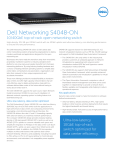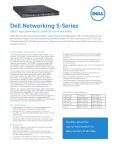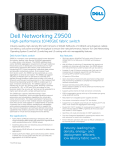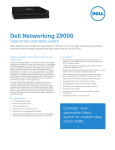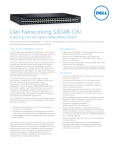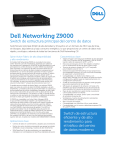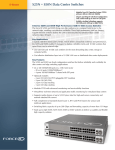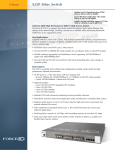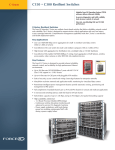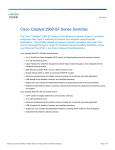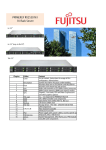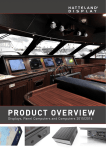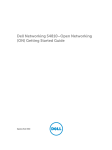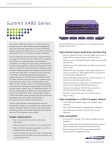Download DELL Force10 S4810P
Transcript
Dell Networking S4810 High-performance 10/40GbE top-of-rack switch High-density, 1RU 48-port 10GbE switch with four 40GbE uplinks and ultra-low-latency, non-blocking performance to ensure line-rate performance; complete with feature-rich Dell Networking OS and storage optimization for iSCSI, FCoE transit and DCB. Ultra-low-latency, data center optimized The Dell Networking S-Series S4810 is an ultra-low-latency 10/40GbE top-of-rack (ToR) switch purpose-built for applications in high-performance data center and computing environments. Leveraging a non-blocking, cut-through switching architecture, the S4810 delivers line-rate L2 and L3 forwarding capacity with ultra low latency to maximize network performance. The compact S4810 design provides 48 dual-speed 1/10GbE (SFP+) ports as well as four 40GbE QSFP+ uplinks to conserve valuable rack space and simplify the migration to 40Gbps in the data center core. Priority-based flow control (PFC), data center bridge exchange (DCBX) and enhance transmission selection (ETS), coupled with ultra low latency and line rate throughput, make the S4810 ideally suited for iSCSI storage, FCoE transit and DCB environments. In addition, the S4810 incorporates multiple architectural features that optimize data center network flexibility, efficiency and availability, including I/O panel to PSU airflow or PSU to I/O panel airflow for hot/cold aisle environments, and redundant, hot-swappable power supplies and fans. The S4810 also supports Dell Networking’s Embedded Open Automation Framework, which provides advanced network automation and virtualization capabilities for virtual data center environments. An Active Fabric™ design with S4810 switches can be built out to create scalable, high-performance 10/40GbE data center networks. The resiliency of an Active Fabric is superior to legacy, centralized core architectures, since the failure of a single node within a CLOS network cannot bring down the entire switching fabric. The S4810 is supported with Active Fabric Manager (AFM), which helps automate design and deployment of multi-tier fabrics. AFM helps customers manage multiple fabrics from a single console, enabling a unified view of the entire fabric, when combined with Dell OMNM and other management solutions. With AFM, over 25 templates can be customized for specific workload and deployment scenarios, easily delivering active/active L2 or L3 designs for 1/10/40G with Dell Z Series switches to rack and blade infrastructures (including Dell MXL). Key applications • • • High-density 10GbE ToR server aggregation in highperformance data center environments Design with the Z Series fabric core switch to create a flat, two-tier, non-blocking 1/10/40GbE data center network design Design a Clos-based Active Fabric with Z Series switches in leaf and spine with the S4810/S4820T 10GbE ToR switches for cost-effective aggregation of 10GbE uplinks * Full 1.3 compliance available in early Q1CY15. • • Enterprise iSCSI (iSCSI over DCB) High-performance SDN/OpenFlow 1.0/1.3* enabled with ability to inter-operate with industry standard OpenFlow controllers Key features • • • • • • • • • • • 1RU high-density 10/40GbE ToR switch with 48 dual-speed 1/10GbE (SFP+) ports and four 40GbE (QSFP+) uplinks (totaling 64 10GbE ports with breakout cables) 1.28Tbps (full-duplex) non-blocking, cut-through switching fabric delivers line-rate performance under full load with 800ns latency Scalable L2 and L3 Ethernet switching with QoS and a full complement of standards-based IPv4 and IPv6 features, including OSPF, BGP and Policy Based Routing (PBR) support VRF-lite enables sharing of networking infrastructure and provides L3 traffic isolation across tenants Increase VM Mobility region by stretching L2 VLAN within or across two DCs with unique VLT capabilities like Routed VLT, VLT Proxy Gateway User port stacking support for up to six units Embedded Open Automation Framework adds VM awareness as well as automated configuration and provisioning capabilities to simplify the management of virtual network environments Modular Dell Networking OS software delivers inherent stability as well as advanced monitoring and serviceability functions Enhanced mirroring capabilities including 1:4 local mirroring, Remote Port Mirroring (RPM) and Encapsulated Remote Port Mirroring (ERPM). Rate shaping combined with flow based mirroring enables the user to analyze fine grained flows Redundant, hot-swappable power supplies and fans Hardware support for DCB, FIPS operation Ultra-low-latency 10GbE top-of-rack switch optimized for data center efficiency. Specifications: S4810 high-performance 10/40-GbE top-of-rack switch Dell SKU description S4810 S4810, 48x 10GbE SFP+, 4x QSFP+, 1x AC PSU, 2x Fans, I/O Panel to PSU Airflow S4810, 48x 10GbE SFP+, 4x QSFP+, 1x AC PSU, 2x Fans, PSU to I/O Panel Airflow S4810, 48x 10GbE SFP+, 4x QSFP+, 1x AC PSU, 2x Fans, PSU to I/O Panel Airflow, Rear Mnt Bracket S4810, 48x 10GbE SFP+, 4x QSFP+, 1x DC PSU, 2x Fans, I/O Panel to PSU Airflow S4810, 48x 10GbE SFP+, 4x QSFP+, 1x DC PSU, 2x Fans, PSU to I/O Panel Airflow S4810, 48x 10GbE SFP+, 4x QSFP+, 1x AC PSU, 2x Fans, I/O panel to PSU Airflow (Normal), TAA/FIPS/USGv6-L2 S4810, 48x 10GbE SFP+, 4x QSFP+, 1x AC PSU, 2x Fans, PSU to I/O Panel Airflow (Reverse), TAA/FIPS/USGv6-L2 S4810, 48x 10GbE SFP+, 4x QSFP+, 1x AC PSU, 2x Fans, I/O Panel to PSU (Normal) Airflow, TAA/FIPS/USGv6-L2 S4810, 48x 10GbE SFP+, 4x QSFP+, 1x AC PSU, 2x Fans, PSU to I/O Panel (Reverse) Airflow, TAA/FIPS/USGv6-L2 Redundant power supplies S4810, AC Power Supply, I/O Panel to PSU Airflow S4810, AC Power Supply, PSU to I/O Panel Airflow S4810, DC Power Supply, I/O Panel to PSU Airflow S4810, DC Power Supply, PSU to I/O Panel Airflow Fans S4810 Fan Module, I/O Panel to PSU Airflow S4810 Fan Module, PSU to I/O SR4 Panel Airflow Optics Transceiver, QSFP+, 40GbE SR Optics, 850nm Wavelength, 100–150m Reach on OM3/OM4 Transceiver, QSFP+, 40GbE eSR Optics, 850nm Wavelength, 300–400m Reach on OM3/OM4 Transceiver, SFP+, 10GbE, SR, 850nm Wavelength, 300m Reach Transceiver, SFP+, 10GbE, LR, 1310nm Wavelength, 10km Reach Transceiver, SFP+, 10GbE, DWDM, ITU Channel 17–61, 40km Reach Transceiver, SFP+, 10GbE, ER, 1310nm Wavelength, 40km Reach Transceiver, SFP+ LRM (Long Reach Multimode) Optic, 10GbE, 1310nm Wavelength, 220m Reach on MMF Transceiver, SFP, 1000Base-SX, 850nm Wavelength, 550m Reach Transceiver, SFP, 1000Base-LX, 1310nm Wavelength, 10km Reach Transceiver, SFP, 1000Base-T Transceiver, SFP, 1000Base-ZX, 1550nm Wavelength, 80km Reach typical on 9/125um SMF Cables Cable, 40GbE QSFP+ to 4xSFP+, Direct Attach Breakout Cable, 0.5m, 1m, 3m, 5m, 7m Cable, 40GbE QSFP+, Active Fiber Optic, 10m, 50m Cable, 40GbE QSFP+, Direct Attach Cable, 0.5m, 1m, 3m, 5m, 7m Cable, 40GbE MTP to 4xLC, 1m, 3m, 5m, 7m Optical Breakout Cable (optics not included) Cable, 40GbE MTP Fiber over OM3, 1m, 3m, 5m, 7m, 10m, 25m, 50m (75m and 100m in 2014) Cable, SFP+, CU, 10GbE, Direct Attach Cable, 0.5m, 1m, 3m, 5m, 7m Software Software, Dell Networking Operating System, S4810 Software, Networking, iSCSI-Optimized Configuration, S4810 Software, Networking, FCOE-Optimized Configuration, S4810 Note: In-field change of airflow direction not supported. IPv4 multicast table size 4K LAG load balancing: Based on Layer 2, IPv4 or IPv6 headers Latency:800ns Packet buffer memory: 9MB CPU memory: 2GB IEEE compliance 802.1AB LLDP 802.1ag Connectivity Fault Management 802.1D Bridging, STP 802.1p L2 Prioritization 802.1Q VLAN Tagging, Double VLAN Tagging, GVRP 802.1s MSTP 802.1w RSTP 802.1X Network Access Control 802.3ab Gigabit Ethernet (1000BASE-T) 802.3ac Frame Extensions for VLAN Tagging 802.3ad Link Aggregation with LACP 802.3ae 10 Gigabit Ethernet (10GBASE-X) 802.3ba 40 Gigabit Ethernet (40GBase-SR4, 40GBase-CR4) on Optical Ports 802.3u Fast Ethernet (100BASE-TX) on Management Ports 802.3x Flow Control 802.3z Gigabit Ethernet (1000BASE-X) ANSI/TIA-1057 LLDP-MED Force10PVST+ MTU 12,000 bytes RFC and I-D compliance General Internet protocols 768 793 UDP TCP General IPv4 protocols 791 IPv4 792 ICMP 826 ARP 1027 Proxy ARP 1035 DNS (client) 1042 Ethernet Transmission 1305 NTPv3 1519 CIDR 1542 BOOTP (relay) 1812 Requirements for IPv4 Routers General IPv6 protocols 854 959 Telnet FTP 1918 Address Allocation for Private Internets 2474 Diffserv Field in IPv4 and Ipv6 Headers 2596 Assured Forwarding PHB Group 3164 BSD Syslog 3195 Reliable Delivery for Syslog 3246 Expedited Assured Forwarding 4364 VRF-lite (IPv4 VRF with OSPF and BGP) 5798 VRRP 1981 Path MTU Discovery Features 2460 Internet Protocol, Version 6 (IPv6) Specification 2464 Transmission of IPv6 Packets over Ethernet Networks 2710 Multicast Listener Discovery (MLD) for IPv6 2711 IPv6 Router Alert Option 3810 Multicast Listener Discovery Version 2 (MLDv2) for IPv6 4007 IPv6 Scoped Address Architecture 4213 Basic Transition Mechanisms for IPv6 Hosts and Routers 4291 IPv6 Addressing Architecture 4443 ICMP for IPv6 4861 Neighbor Discovery for IPv6 4862 IPv6 Stateless Address Autoconfiguration 5095 Deprecation of Type 0 Routing Headers in IPv6 IPv6 Management support (telnet, FTP, TACACS, RADIUS, SSH, NTP) Security Physical 48 line-rate 10 Gigabit Ethernet SFP+ ports 4 line-rate 40 Gigabit Ethernet QSFP+ ports 1 RJ45 console/management port with RS232 signaling Size: 1 RU, 1.73 x 17.32 x 18.11” (4.4 x 44 x 46 cm) (H x W x D) Weight: 14.39 lbs (6.54 kg) ISO 7779 A-weighted sound pressure level: 59.6 dBA at 73.4°F (23°C) Power supply: 100–240V AC 50/60Hz Max. thermal output: 1194 BTU/h Max. current draw per system: 4A at 100/120V AC 2A at 200/240V AC 10A at 36V DC 5A at 72V DC Max. power consumption: 350 Watts (AC), 300 Watts (DC) Typ. power consumption: 220 Watts Max. operating specifications: Operating temperature: 32°F to 104°F (0°C to 40°C) Operating humidity: 10 to 85% (RH), non-condensing Max. non-operating specifications: Storage temperature: –40°F to 158°F (–40°C to 70°C) Storage humidity: 5 to 95% (RH), non-condensing Redundancy Hot swappable redundant power supplies Hot swappable redundant fans Performance MAC addresses: IPv4 routes: IPv6 routes: Switch fabric capacity: Forwarding capacity: Link aggregation: Queues per port: Layer 2 VLANs: MSTP : VRF-lite: Line-rate layer 2 switching: Line-rate layer 3 routing: IPv4 host table size IPv6 host table size 128K 16K 8K (shared CAM space with IPv4) 1.28Tbps (full-duplex) 640Gbps (half-duplex) 960Mpps 8 links per group, 128 groups per stack 4 queues 4K 64 instances 64 instances All protocols, including IPv4 and IPv6 IPv4 and IPv6 8K 4K 2404 The Use of HMAC- SHA-1-96 within ESP and AH 2865 RADIUS 3162 Radius and IPv6 3579 Radius support for EAP 3580 802.1X with RADIUS 3768 EAP 3826 AES Cipher Algorithm in the SNMP User Base Security Model 4250, 4251, 4252, 4253, 4254 SSHv2 4301 Security Architecture for IPSec 4302 IPSec Authentication Header 4303 ESP Protocol 4807 IPsecv Security Policy DB MIB RIPv1 2453 RIPv2 OSPF (v2/v3) 1587 2154 2328 NSSA 4552 OSPF Digital Signatures OSPFv2 2370 Opaque LSA BGP 1997 Communities 5340 Authentication/ Confidentiality for OSPFv3 OSPF for IPv6 2385MD5 2545 BGP-4 Multiprotocol Extensions for IPv6 Inter-Domain Routing 2439 Route Flap Damping 2796 Route Reflection 2842 Capabilities 2858 Multiprotocol Extensions 2918 Route Refresh 3065 Confederations 4360 Extended Communities 4893 4-byte ASN 5396 4-byte ASN representations draft-ietf-idr-bgp4-20 BGPv4 draft-michaelson-4byte-as-representation-05 4-byte ASN Representation (partial) draft-ietf-idr-add-paths-04.txt ADD PATH Multicast 1112 2236 3376 IGMPv1 IGMPv2 IGMPv3 Data center bridging 802.1Qbb Priority-Based Flow Control 802.1Qaz Enhanced Transmission Selection (ETS) Data Center Bridging eXchange (DCBx) DCBx Application TLV (iSCSI, FCoE) Network management 1155 SMIv1 1157 SNMPv1 1212 Concise MIB Definitions 1215 SNMP Traps 1493 Bridges MIB 1850 OSPFv2 MIB 1901 Community-Based SNMPv2 2011 IP MIB 2096 IP Forwarding Table MIB 2578 SMIv2 2579 Textual Conventions for SMIv2 2580 Conformance Statements for SMIv2 2618 RADIUS Authentication MIB 2665 Ethernet-Like Interfaces MIB 2674 Extended Bridge MIB 2787 VRRP MIB 2819 RMON MIB (groups 1, 2, 3, 9) 2863 Interfaces MIB 3273 RMON High Capacity MIB 3410SNMPv3 3411 SNMPv3 Management Framework 3412 Message Processing and Dispatching for the Simple Network Management Protocol (SNMP) 3413 SNMP Applications 3414 User-based Security Model (USM) for SNMPv3 3415 VACM for SNMP 3416SNMPv2 3417 Transport mappings for SNMP 3418 SNMP MIB 3434 RMON High Capacity Alarm MIB 3584 Coexistance between SNMP v1, v2 and v3 4022 IP MIB 4087 IP Tunnel MIB 4113 UDP MIB 4133 Entity MIB 4292 MIB for IP 4293 MIB for IPv6 Textual Conventions 4502 RMONv2 (groups 1,2,3,9) 5060 PIM MIB ANSI/TIA-1057 LLDP-MED MIB Dell_ITA.Rev_1_1 MIB draft-grant-tacacs-02 TACACS+ draft-ietf-idr-bgp4-mib-06 BGP MIBv1 IEEE 802.1AB LLDP MIB IEEE 802.1AB LLDP DOT1 MIB IEEE 802.1AB LLDP DOT3 MIB sFlow.org sFlowv5 sFlow.org sFlowv5 MIB (version 1.3) FORCE10-BGP4-V2-MIB Force10 BGP MIB (draft-ietf-idr-bgp4-mibv2-05) FORCE10-IF-EXTENSION-MIB FORCE10-LINKAGG-MIB FORCE10-COPY-CONFIG-MIB FORCE10-PRODUCTS-MIB FORCE10-SS-CHASSIS-MIB FORCE10-SMI FORCE10-TC-MIB FORCE10-TRAP-ALARM-MIB FORCE10-FORWARDINGPLANE-STATS-MIB Regulatory compliance Safety UL/CSA 60950-1, Second Edition EN 60950-1, Second Edition IEC 60950-1, Second Edition Including All National Deviations and Group Differences EN 60825-1 Safety of Laser Products Part 1: Equipment Classification Requirements and User’s Guide EN 60825-2 Safety of Laser Products Part 2: Safety of Optical Fibre Communication Systems FDA Regulation 21 CFR 1040.10 and 1040.11 Emissions RIP 1058 MSDP draft-ietf-pim-sm-v2-new-05 PIM-SMw Australia/New Zealand: AS/NZS CISPR 22: 2006, Class A Canada: ICES-003, Issue-4, Class A Europe: EN 55022: 2006+A1:2007 (CISPR 22: 2006), Class A Japan: VCCI V3/2009 Class A USA: FCC CFR 47 Part 15, Subpart B:2011, Class A Immunity EN 300 386 V1.4.1:2008 EMC for Network Equipment EN 55024: 1998 + A1: 2001 + A2: 2003 EN 61000-3-2: Harmonic Current Emissions EN 61000-3-3: Voltage Fluctuations and Flicker EN 61000-4-2: ESD EN 61000-4-3: Radiated Immunity EN 61000-4-4: EFT EN 61000-4-5: Surge EN 61000-4-6: Low Frequency Conducted Immunity RoHS All S Series components are EU RoHS compliant. Certifications Available with US Trade Agreements Act (TAA) compliance USGv6 Host and Router Certified on Dell Networking OS 9.5 and greater IPv6 Ready for both Host and Router UCR DoD APL (core and distribution ALSAN switch) Learn More at Dell.com/Networking October 2014 | Version 2.6 dell-networking-s series-S4810-spec sheet © 2014 Dell Inc. All rights reserved. Dell and the DELL logo are trademarks of Dell, Inc. All other company names are trademarks of their respective holders. Information in this document is subject to change without notice. Dell Inc. assumes no responsibility for any errors that may appear in this document.


